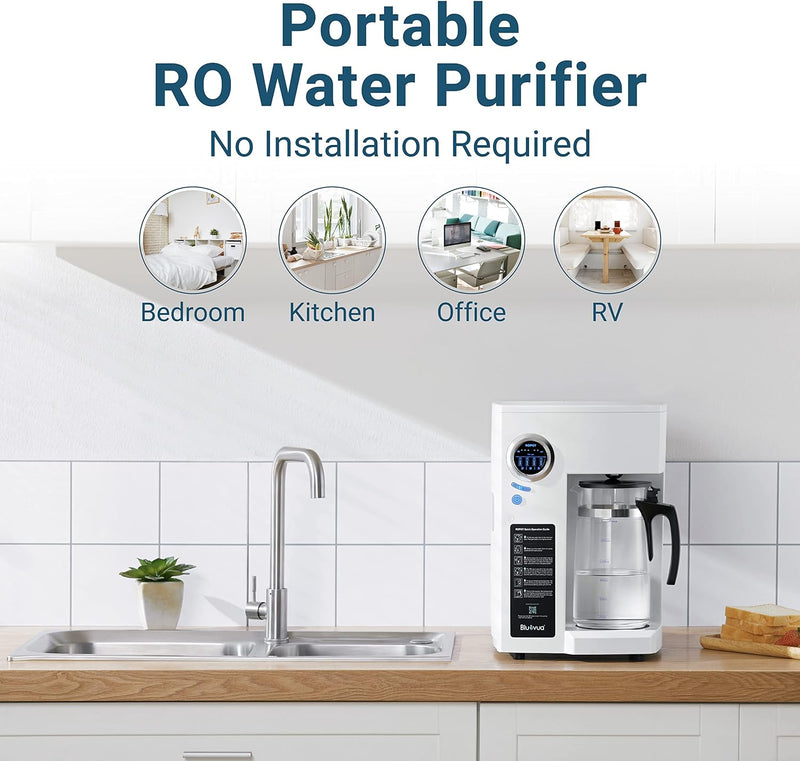Unlocking Pure Perfection: The Ultimate Guide to Choosing Your Dream RO Water Filter!
In today's world, access to clean and safe drinking water is more crucial than ever. With increasing concerns about water quality, many households are turning to reverse osmosis (RO) water filter systems to ensure they provide pure drinking water for their families. These systems have gained immense popularity due to their ability to remove contaminants effectively and enhance the taste of water. As the market for RO water filters expands, so does the challenge of selecting the right system that meets individual needs. This guide aims to compare various options available, helping you make an informed purchase that prioritizes your health and satisfaction.

Understanding RO Water Filter Systems
RO, or Reverse Osmosis, water filter systems are advanced filtration technologies designed to purify water by removing impurities and contaminants. The process involves pushing water through a semipermeable membrane that allows only water molecules to pass while blocking larger molecules, including salts, chemicals, and other impurities. This results in cleaner, safer drinking water that is free from harmful substances. The benefits of using an RO system are numerous: not only do they remove contaminants such as lead, chlorine, and fluoride, but they also significantly improve the taste and odor of tap water, making hydration a more enjoyable experience. Additionally, many systems come equipped with multiple filtration stages, ensuring that water is thoroughly purified before reaching your glass.
Key Features to Consider When Choosing an RO Water Filter
When selecting an RO water filter system, it's essential to consider various features that will cater to your specific needs. First, take note of the filtration stages; a standard RO system typically includes multiple stages, such as pre-filters for sediment and activated carbon filters for chlorine removal, which enhance the overall effectiveness of the system. Storage capacity is another crucial factor; if you have a large family or consume a lot of water, look for systems with larger storage tanks. Maintenance requirements are also important to consider; some systems may require frequent filter changes, while others are designed for longer intervals between maintenance. Ultimately, understanding these features will help you choose a system that best aligns with your lifestyle and preferences.
Comparing Different Types of RO Water Filters
RO water filters come in various types, each designed for specific applications and living situations. Under-sink systems are popular for their space-saving design and ability to provide filtered water directly from the tap, making them an excellent choice for households that prioritize aesthetics and convenience. Countertop systems offer portability and ease of installation, perfect for renters or those who frequently move. Whole house systems, on the other hand, provide comprehensive water filtration for every tap in your home and are ideal for families who want to ensure the quality of all their water sources. However, they may come with a higher price tag and require professional installation. Evaluating the pros and cons of each type will help identify the best fit for your home.
Brand and Model Comparisons
While there are numerous brands and models available in the market, it's essential to focus on their unique features and user satisfaction rather than their names. Some systems may stand out due to their advanced filtration technologies or user-friendly designs. For instance, certain models are known for their high efficiency in water purification, while others boast innovative features such as automatic filter change notifications or smart technology integration. Customer satisfaction can provide valuable insight into reliability and performance, with many users praising systems that offer excellent support and warranty options. By comparing these elements, you can identify which systems align with your expectations and lifestyle.
Installation and Maintenance Tips
Installing a system can be a straightforward process, allowing you to enjoy pure water with minimal hassle. Whether you choose a DIY setup or hire a professional, it’s vital to follow the manufacturer’s guidelines to ensure optimal performance. Regular maintenance tasks include cleaning the filters and replacing them periodically, as this will extend the lifespan of your unit. Many systems come with recommended maintenance schedules, but it’s a good practice to check them regularly to keep your filter functioning at its best. Also, if you’re installing under-sink systems, be sure to assess your plumbing to avoid complications. With the right care, your RO water filter will provide you with high-quality drinking water for years to come.
Making an Informed Decision on RO Water Filters
Choosing the right RO water filter system is a significant decision that can greatly impact your health and well-being. By understanding the technology behind RO systems, considering key features, and comparing different types and brands, you can make a well-informed choice that meets your household’s needs. Remember to weigh your options carefully, as investing in a quality water filter is an investment in your family’s health. With the right system in place, you can enjoy peace of mind knowing that you are providing clean and safe drinking water for your loved ones.














